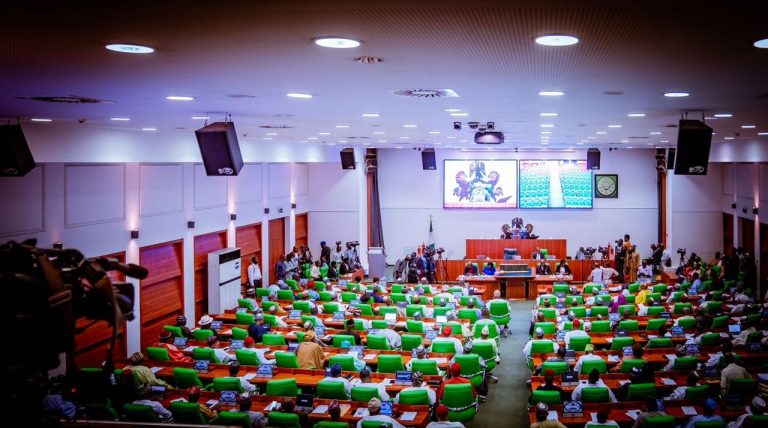From Ndubuisi Orji, Abuja
The House of Representative has also approved a bill proposing 60 years as the maximum age limit for presidential and gubernatorial candidates for second reading.
The bill sponsored by the member representing Ideato Federal Constituency of Imo State, Ikeagwuonu Ugochinyere, is also proposing a minimum of first degree as educational qualifications for anyone aspiring to serve as president and governor.
The proposed legislation titled ”Bill for an Act to Alter the Constitution of the Federal Republic of Nigeria, 1999 to Review the Requirements that Qualifies a Persons to be Elected as President and Vice-President of the Federal Republic of Nigeria, Governors and Deputy Governor of a State of the Federal Republic of Nigeria and for Related Matters (HB.202), was among the 32 constitution alteration bills approved for second reading, at Thursday’s plenary, and referred to the Committee on Constitution Review for further legislative action.
The bill seeking the alteration of Sections 131 and 177 of the 1999 Constitution (as amended), according to its explanatory memorandum, is intended to review the qualifications for election as President, Vice President, Governor and Deputy Governor.
“Section 131(d)of the Principal Act is amended by altering the educational requirements that qualifies a person to be elected as President as follows: A person shall be qualified for election to the office of President if-(d)he has been educated up to at least University level and has earned a Bachelor’s Degree in his chosen field of study. Section 131 of the Principal Act is amended by inserting a new paragraph(e)as follows: he is not more than sixty (60) years at the time of vying for the office of President.
“Section 177(d)of the Principal Act is amended by altering the educational requirements that qualifies a person to be elected as Governor as follows: A person shall be qualified for election to the office of Governor if- he has been educated up to at least University level and has earned a Bachelor’s Degree in his chosen field of study.
“Section 177 of the Principal Act is amended by inserting a new paragraph (e)as follows:(e) he is not more than sixty (60) years at the time of vying for the office of Governor of a State,” the bill reads.
Currently, Section 131 of the 1999 Constitution (as amended) pegs the minimum age limit to contest for the office of President at years and school certificate as minimum educational qualifications. However, the constitution does not prescribe a maximum age limit for candidates to the office.
Similarly, Section 177 prescribes 35 years as a minimum age limit, as well as school certificate as a minimum educational qualification for candidates for the office of the governor.
Also, the House approved for second reading, a bill seeking to alter the Constitution to make it mandatory for presidential and governorship candidates to secure more than 50 percent of votes cast in an election, where there are more than two candidates, to be declared winner.
The proposed legislation, which is sponsored by Awaji Inombek Abiante, seeks to alter Section 134 (1)(a), (2)(a), (4)(a) and Section 179 (2)(a) (3) (a) of the Constitution “by changing the system of the simple majority of electing the President of the Federal Republic of Nigeria and the State Governors where there are more than two candidates to ensure the winner score more than half of the total votes cast.”
Presently, Section 134 (a) (b) of the Constitution requires a candidate, where they are two candidates, to secure majority of votes, as well as not less than one quarter of the votes cast at the election “in each of at least two-thirds of all the states and the Federal Capital Territory, Abuja.”
Similarly, Section 179(2)(a)(b) stipulates that a governorship candidate, where there are two or more candidates shall secure majority of votes and at least one quarter of votes cast in each of at least two -third of all the local government areas in the State to be declared winner.
Also, the House rescinded its decision on a bill to strip the Vice President, governors and deputy governors of immunity from civil and criminal prosecution.
The House rescinded its decision on the bill, which was passed for second reading, on Wednesday, following a motion by the House leader, Julius Ihonbvere and seconded by the minority leader, Kingsley Chinda.
The bill sponsored by Solomon Bob is seeking the alteration of Section 308 of the 1999 Constitution (as amended), to restrict immunity to the President and the Vice president while acting as President, was approved for second reading on Wednesday.
The proposed legislation, according to its explanatory memorandum, is intended “to remove the immunity conferred on the Vice President, State Governors and their deputies, and to qualify the immunity conferred on the President.”
Deputy Speaker, Benjamin Kalu, who presided over yesterday’s plenary, said the bill will be slated again for second reading to enable members debate the general principles because of the sensitive nature of the proposed legislation.
Furthermore, the parliament passed for second reading a bill seeking to make the conduct of population census in the country mandatory after every 10 years, after the publication of a population census report by the President in the official gazette of the Federal Government.
The proposed legislation, sponsored by the deputy speaker, and six others, seeks to alter Section 213 and third schedule of the 1999 Constitution (as amended).
According to the bill, “Section 213 of the Principal Act is altered by inserting after subsection (5), a new subsection “(5A)” as follows – (5A) There shall be a population census every ten years after publication by the President of a population census report in the official gazette of the government of the Federation.
“Third Schedule, Part I, item-J of the Principal Act is altered by substituting the existing subparagraph (a), with a new subparagraph “(a)” as follows – (a) undertake enumeration of the population every ten years through sample survey census or otherwise.”
